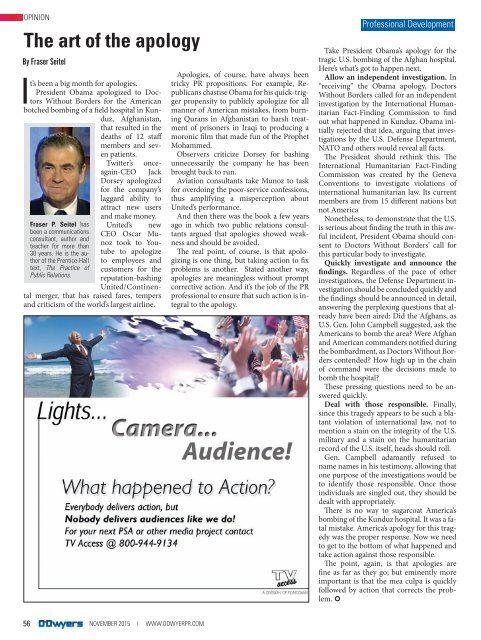Communications & New Media Nov 2015 Vol 29 No 11
odwyers-magazine-november-2015
odwyers-magazine-november-2015
You also want an ePaper? Increase the reach of your titles
YUMPU automatically turns print PDFs into web optimized ePapers that Google loves.
OPINION<br />
The art of the apology<br />
By Fraser Seitel<br />
It’s been a big month for apologies.<br />
President Obama apologized to Doctors<br />
Without Borders for the American<br />
botched bombing of a field hospital in Kunduz,<br />
Afghanistan,<br />
that resulted in the<br />
deaths of 12 staff<br />
members and seven<br />
patients.<br />
Twitter’s onceagain-CEO<br />
Jack<br />
Dorsey apologized<br />
for the company’s<br />
laggard ability to<br />
attract new users<br />
and make money.<br />
Fraser P. Seitel has<br />
been a communications<br />
consultant, author and<br />
teacher for more than<br />
30 years. He is the author<br />
of the Prentice-Hall<br />
text, The Practice of<br />
Public Relations.<br />
United’s new<br />
CEO Oscar Munoz<br />
took to Youtube<br />
to apologize<br />
to employees and<br />
customers for the<br />
reputation-bashing<br />
United/Continental<br />
merger, that has raised fares, tempers<br />
and criticism of the world’s largest airline.<br />
Apologies, of course, have always been<br />
tricky PR propositions. For example, Republicans<br />
chastise Obama for his quick-trigger<br />
propensity to publicly apologize for all<br />
manner of American mistakes, from burning<br />
Qurans in Afghanistan to harsh treatment<br />
of prisoners in Iraqi to producing a<br />
moronic film that made fun of the Prophet<br />
Mohammed.<br />
Observers criticize Dorsey for bashing<br />
unnecessarily the company he has been<br />
brought back to run.<br />
Aviation consultants take Munoz to task<br />
for overdoing the poor-service confessions,<br />
thus amplifying a misperception about<br />
United’s performance.<br />
And then there was the book a few years<br />
ago in which two public relations consultants<br />
argued that apologies showed weakness<br />
and should be avoided.<br />
The real point, of course, is that apologizing<br />
is one thing, but taking action to fix<br />
problems is another. Stated another way,<br />
apologies are meaningless without prompt<br />
corrective action. And it’s the job of the PR<br />
professional to ensure that such action is integral<br />
to the apology.<br />
Professional Development<br />
Take President Obama’s apology for the<br />
tragic U.S. bombing of the Afghan hospital.<br />
Here’s what’s got to happen next.<br />
Allow an independent investigation. In<br />
“receiving” the Obama apology, Doctors<br />
Without Borders called for an independent<br />
investigation by the International Humanitarian<br />
Fact-Finding Commission to find<br />
out what happened in Kunduz. Obama initially<br />
rejected that idea, arguing that investigations<br />
by the U.S. Defense Department,<br />
NATO and others would reveal all facts.<br />
The President should rethink this. The<br />
International Humanitarian Fact-Finding<br />
Commission was created by the Geneva<br />
Conventions to investigate violations of<br />
international humanitarian law. Its current<br />
members are from 15 different nations but<br />
not America<br />
<strong>No</strong>netheless, to demonstrate that the U.S.<br />
is serious about finding the truth in this awful<br />
incident, President Obama should consent<br />
to Doctors Without Borders’ call for<br />
this particular body to investigate.<br />
Quickly investigate and announce the<br />
findings. Regardless of the pace of other<br />
investigations, the Defense Department investigation<br />
should be concluded quickly and<br />
the findings should be announced in detail,<br />
answering the perplexing questions that already<br />
have been aired: Did the Afghans, as<br />
U.S. Gen. John Campbell suggested, ask the<br />
Americans to bomb the area? Were Afghan<br />
and American commanders notified during<br />
the bombardment, as Doctors Without Borders<br />
contended? How high up in the chain<br />
of command were the decisions made to<br />
bomb the hospital?<br />
These pressing questions need to be answered<br />
quickly.<br />
Deal with those responsible. Finally,<br />
since this tragedy appears to be such a blatant<br />
violation of international law, not to<br />
mention a stain on the integrity of the U.S.<br />
military and a stain on the humanitarian<br />
record of the U.S. itself, heads should roll.<br />
Gen. Campbell adamantly refused to<br />
name names in his testimony, allowing that<br />
one purpose of the investigations would be<br />
to identify those responsible. Once those<br />
individuals are singled out, they should be<br />
dealt with appropriately.<br />
There is no way to sugarcoat America’s<br />
bombing of the Kunduz hospital. It was a fatal<br />
mistake. America’s apology for this tragedy<br />
was the proper response. <strong>No</strong>w we need<br />
to get to the bottom of what happened and<br />
take action against those responsible.<br />
The point, again, is that apologies are<br />
fine as far as they go; but eminently more<br />
important is that the mea culpa is quickly<br />
followed by action that corrects the problem.<br />
<br />
56 NOVEMBER <strong>2015</strong> | www.ODwyERPR.COM


